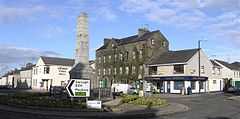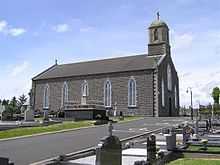Kilrea
| Kilrea | |
| Irish: Cill Ria | |
 |
|
 |
|
| Population | 1,513 (2001 Census) |
|---|---|
| District | Causeway Coast and Glens District Council |
| County | County Londonderry |
| Country | Northern Ireland |
| Sovereign state | United Kingdom |
| Post town | COLERAINE |
| Postcode district | BT51 |
| Dialling code | 028 |
| EU Parliament | Northern Ireland |
| UK Parliament | East Londonderry |
| NI Assembly | East Londonderry |
|
|
Coordinates: 54°58′00″N 6°35′00″W / 54.966667°N 6.583333°W
Kilrea (pronounced /kɪlˈreɪ/ kil-RAY, from Irish: Cill Ria)[1][2] is a village, townland, historic town and civil parish in County Londonderry, Northern Ireland. In Irish the words "Cill Ria" mean church on the hill, and that is due to the fact that St. Patrick's Church of Ireland sits on Church Street looking over the town. It is near the River Bann, which marks the boundary between County Londonderry and County Antrim. In the 2001 Census it had a population of 1,513 people.[3]
History
There is a tradition that St Patrick visited the area during the fifth century, a story repeated recently in the book 'The Fairy Thorn' produced by Kilrea local historians. During the Plantation of Ulster Kilrea and the surrounding townlands were granted to the Worshipful Company of Mercers by King James I for settlement.[4] Their headquarters in Ulster were at nearby Movanagher on the banks of the River Bann. Today Kilrea is a market town and commercial centre of the surrounding district. The village is centred on 'The Diamond' which includes the town's War Memorial erected in honour of Kilrea men killed in the Great War.[5] The village is featured in the Orange song, Sprigs of Kilrea. It is also mentioned in the song Kitty the rose of Kilrea by The Irish Rover band.
The Troubles
Festival of the Fairy Thorn
A feature of Kilrea is its 'Fairy Thorn' tree in the grounds of First Kilrea Presbyterian Church. It is the focal point of the annual summer cross-community festival in the town.[6]
People
- Martin O'Neill
- Hannah Shields, second Irish woman to climb Mount Everest.[7]
- John Dallat, first nationalist mayor of the Borough of Coleraine
- Monica McWilliams
Sport

- Kilrea Angling Club
- Kilrea Camogie Club
- Kilrea Golf Club
- Kilrea Pádraig Pearses GAC
- Kilrea United Football Club
- Manor Golf and Sports Club
- Go Pro Kart Racing Movanagher Road
- Kilrea Sports Complex
Education
- Kilrea Primary School
- St Columba's Primary School
- St Paul's College
- Crossroads Primary School
Religion
- Boveedy Presbyterian Church
- First Kilrea Presbyterian Church
- Kilrea Baptist Church
- Second Kilrea Presbyterian Church
- St Anne's Roman Catholic Church[8]
- St Patrick's Church of Ireland
- Drumagarner Roman Catholic Church

2001 Census
Kilrea is classified as a village by the NI Statistics and Research Agency (NISRA) (i.e., with population between 1,000 and 2,250 people). On Census day (29 April 2001) there were 1,513 people living in Kilrea. Of these:
- 27.0% were aged under 16 years and 16.7% were aged 60 and over
- 49.0% of the population were male and 51.0% were female
- 69.3% were from a Catholic background and 29.8% were from a Protestant background
- 5.2% of people aged 16–74 were unemployed
For more details see the Northern Ireland Neighbourhood Information Service
See also
References
External links
| Wikimedia Commons has media related to Kilrea. |

